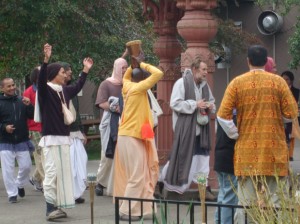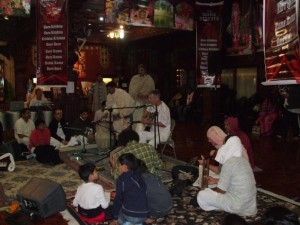SB 11.23.48 – Be not sucked in by mind-triggered relationship conflicts
28 Oct 2013 – Appearance Day of Virabhadra
→ ISKCON Desire Tree
By giving power of attorney to the mind, we let ourselves be robbed
→ The Spiritual Scientist
If one gets a good manager, his estate is very nicely managed, but if the manager is a thief, his estate is spoiled. Similarly, in his material, conditional existence, the living entity gives power of attorney to his mind. As such, he is liable to be misdirected by his mind into enjoying sense objects.
Srila Prabhupada
SB 11.07.21 – The endeavor to train the mind never goes in vain
→ The Spiritual Scientist
Radha Kunda Festival – Tomorrow!
→ The Toronto Hare Krishna Blog!
 There are many places of pilgrimage for Krishna devotees, especially in India. Devotees visit them to become inspired in their spiritual lives. Devotees of Krishna observe the appearance of Radha Kunda, also known as Bahulashtami. This Saturday, October 26, 2013 the Hare Krishna Centre will be celebrating this auspicious occasion beginning at 6:00pm and will include kirtan and a wonderful discourse.
There are many places of pilgrimage for Krishna devotees, especially in India. Devotees visit them to become inspired in their spiritual lives. Devotees of Krishna observe the appearance of Radha Kunda, also known as Bahulashtami. This Saturday, October 26, 2013 the Hare Krishna Centre will be celebrating this auspicious occasion beginning at 6:00pm and will include kirtan and a wonderful discourse.Radha Kunda is a reservoir of water located in Vrindavan, India, where Krishna and Srimati Radharani had Their pastimes. It is mentioned in Sri Isopanishad and other Vedic texts as one of the most sacred places in the universe. Be sure to come out and be transported to this amazing place!
Further, this Sunday' festivities will be extra special as we will have a themed Sunday Feast, celebrating the appearance of Radha Kunda. Festivities will begin at 6:00pm, continue through to 9:00pm and will feature kirtan, class and wonderful prasadam!
Wednesday, October 23rd, 2013
→ The Walking Monk
Tuesday, October 22nd, 2013
→ The Walking Monk
How Some People Take Up Japa
→ Japa Group
The slightly older lady seemed interested and told me how she was into meditation and then stopped. So I showed her the books and when she finally decided to take the book, I decided to probe deeper. So I started to ask her about what kind of meditation she was doing?
She told me a few years ago she had heard a mantra at some program and then she told me she had been chanting this mantra (the Hare Krsna mantra) for a year and then life got busy and she stopped for a while and now recently she wanted to chant again and was looking to join some meditation program. I explained to her how she had met the right people and got the right book to fulfill her desires. It was magical to see how Krishna arranges these sankirtan encounters."
This story gave me faith that the chanting of Hare Krsna is a very powerful weapon in the age of Kali and by this chanting the effects of the material world can be reduced and eventually vanquished.
Radha-Damodara over the last week
→ SivaramaSwami.com
The post Radha-Damodara over the last week appeared first on SivaramaSwami.com.
It was a Sweet 24 Hour Kirtan in New Vrindaban
→ New Vrindaban Brijabasi Spirit
Madhuram Madhuram
Intimate and sweet. Those were the words most often used to describe this year’s Kartik 24 Hour Kirtan in New Vrindaban. The main organizer of this year’s kirtan, Vrindavan das, expressed it this way, “Many of the devotees told me that although the bigger and more extravagant summer 24 hour kirtans are always exciting, still this kirtan had a special, intimate feeling that made people feel more connected. There weren’t all the usual well-known kirtan leaders but many said that they really appreciated the more traditional and intimate kirtan mood of this weekend.”
People also liked the variety of kirtan styles: bluegrass kirtan, ukulele kirtan, flute kirtan, to name a few.
One regular kirtan-goer exclaimed, “When the kirtan is married with devotion, it transports you to the highest place.”
Another young lady from Columbus, Ohio was at the 24 hour kirtan for the very first time. She declared, “This kirtan has been amazing! I can feel that the spiritual energy here is real.”
Another regular kirtan participant confirmed, “I love to chant Hare Krsna even at home, and I do that most of the time, but I especially like the super-charged, collective spiritual energy that I always experience when in the temple 24 hour kirtan. It gets me through until the next time I can attend.
Vrindavan, this year’s kirtan organizer, claims, “We are aiming to double the number of participants at next year’s New Vrindaban Kartik 24 hour kirtan! See you there!”
Current And Former New Vrindaban Residents Lead the Chanting.
Kantor Daniel, a self-proclaimed atheist asks what is it that nurtures the mind with thoughts
→ SivaramaSwami.com
A Day in the Life of a Cowherd Boy in New Vrindaban
→ New Vrindaban Brijabasi Spirit
A Day in The Life of One of Krsna’s Cowherd Boys
“By the end of this week, we’ll be all finished putting up the hay bales in the barn for the season!”
These are words that every farmer likes to be able to boast, before winter sets in. Down at New Vrindaban’s farm and cow shelter, Ranaka was able to make this claim with great satisfaction, as another summer leaves New Vrindaban. “We put up 800 to 1,000 bales this year. It was a good year,” declares Ranaka. This cowherd boy is especially happy because he is helping to fulfill Srila Prabhupada’s vision for New Vrindaban, which includes the importance of cow protection
In addition to the hay, the acre of potatoes that Ranaka plants organically every year have just been dug up for collection, which is another sign that the summer is coming to an end. But Ranaka feels ahead of the game, in preparation for another beautiful, yet sometimes brutal, New Vrindaban winter. Self-sufficiency is one of the other main points in Srila Prabhupada’s vision for New Vrindaban, and the potato crop and other vegetables are a big part of that. As a matter of fact, Ranaka has lived through 36 winters in New Vrindaban, since 1977, and his devoted helper, Ray, has worked with him for most of those years. “Ray is a hard worker and a good guy!” declares Ranaka.
The barns in New Vrindaban first opened almost 28 years ago, in 1985, and have been continually serving Sri Sri Radha Vrindaban Chandra’s cows since that time, following Srila Prabhupada’s mood for the community. This year, there will be some new residents at Krsna’s Goshalla in New Vrindaban, according to Ranaka Prabhu.
“We have three heifers old enough to breed, so we have built a strong pen for them and the bull. Then, in about nine months, the pregnant gomatas can be moved up to the milking barn across from the temple to give birth to their calves.” And at the end of October, the 16 retired cows out to summer pasture in Bahulaban will be brought back down to their winter home at the farm and cow shelter. There’s a lot of action at the Goshalla.
The barn got a new coating on the roof this year! Chaitanya Bhagavat Prabhu was instrumental in organizing this for the barn roof. Ranaka explains: “They rolled out a new coat of aluminum roof coating on the almost 50,000 square footage of roof, to keep the rust under control. It was a hard job, but Chaitanya Bhagavat and some helpers worked hard until it was time for the contractor to come in and spray on the finish.”
We’re happy with it. We’ve been re-doing this barn roof every couple of years, but we’re hoping this new roofing to last longer.”
How Prince Charles of England got Srila Prabhupada’s Bhagavad Gita and Diana, Princess of Wales, a garland prasadam
→ Dandavats.com
 I Gave Him Prabhupadas Gita. He Smiled And Said "Keeping Busy Meditating Are You" I Laughed And Said" Yes Chanting Hare Krishna" I Said We Have A Temple In London You Know Stop Over" He Thanked Me And Moved On. Read more ›
I Gave Him Prabhupadas Gita. He Smiled And Said "Keeping Busy Meditating Are You" I Laughed And Said" Yes Chanting Hare Krishna" I Said We Have A Temple In London You Know Stop Over" He Thanked Me And Moved On. Read more › Is every day in the transcendental abode of Vrindavana simply nectar? (Album 168 photos)
→ Dandavats.com
 Indradyumna Swami: On the auspicious disappearance day of Srila Narottam das Thakur our parikrama party heard his glories from Sitala dasi in a beautiful park next to the temple of Vraja Mohan. Vraja Mohan was one of 7 deities Narottam das Thakur installed in Keturi. Afterwards, we relished walking around the streets of our beloved Vrindavan. Every day in this transcendental abode is simply nectar Read more ›
Indradyumna Swami: On the auspicious disappearance day of Srila Narottam das Thakur our parikrama party heard his glories from Sitala dasi in a beautiful park next to the temple of Vraja Mohan. Vraja Mohan was one of 7 deities Narottam das Thakur installed in Keturi. Afterwards, we relished walking around the streets of our beloved Vrindavan. Every day in this transcendental abode is simply nectar Read more › 29 Photos of Nama Ruci and Gopi Krishna Wedding
→ Dandavats.com
 The importance and responsibility of a good Vaishnava marriage, rooted in ancient Krishna conscious principles, cannot be underestimated, and in many ways is just as important for the future of our society as initiation. Read more ›
The importance and responsibility of a good Vaishnava marriage, rooted in ancient Krishna conscious principles, cannot be underestimated, and in many ways is just as important for the future of our society as initiation. Read more › Beauty queen releases an interview and retells a known story from her point of view!
→ Dandavats.com
 Aksaya is the second son of Mangala who is known for her beauty. A few years ago he won the calf beauty contest and agreed to be interviewed by one of our staff. What follows is that interview Read more ›
Aksaya is the second son of Mangala who is known for her beauty. A few years ago he won the calf beauty contest and agreed to be interviewed by one of our staff. What follows is that interview Read more › Pollution Within And Without – HH Bhakti Rasamrita Swami – Urban Yoga
→ Gouranga TV - The Hare Krishna video collection
Pollution Within And Without – HH Bhakti Rasamrita Swami – Urban Yoga
SB 11.07.20 – To benefit from our guru, we have to become our own guru
→ The Spiritual Scientist
SB 11.07.19 – We need to become intellectually responsible to benefit from Krishna’s mercy
→ The Spiritual Scientist
SB 11.23.47 – Seek God’s power to break free from the godlike power of the autocratic mind
→ The Spiritual Scientist
When the music stops!
→ KKS Blog
(Kadamba Kanana Swami, September 2013, Cape Town, South Africa, Srimad Bhagavatam 8.20.12)
 Many artists are only recognised for their greatness once they are dead but Beethoven was famous during his life - a famous composer, you know, like the complex symphonies. But then, he went deaf. Can you imagine that? It was practically the one thing, the worse thing, that could affect him. For a musician, the ear is essential. People who cannot sing, it is not that they cannot sing – they cannot listen! That is the problem, they cannot listen and they just do not listen. It begins with listening actually. Music begins with listening. So that is all about the ear, really!
Many artists are only recognised for their greatness once they are dead but Beethoven was famous during his life - a famous composer, you know, like the complex symphonies. But then, he went deaf. Can you imagine that? It was practically the one thing, the worse thing, that could affect him. For a musician, the ear is essential. People who cannot sing, it is not that they cannot sing – they cannot listen! That is the problem, they cannot listen and they just do not listen. It begins with listening actually. Music begins with listening. So that is all about the ear, really!
Beethoven, with the perfect ears, who he could perfectly hear different tones and notes, went deaf. So, it was a set up, he became bigger and bigger, he was the greatest and then he went deaf, lost it! He had to go through the agony of everything he had being taken away!
In spiritual life, it is also like this. In spiritual life, in the course of our service we may get recognition; we may get so many facilities and so on, many external attributes. Over the years, you collect a library of your books, your fancy chadaars and everything. But in a spiritual crisis, all that we have is the Krsna consciousness within! Therefore, you have to make commitments within. Internally, we have to say, “Yes Krsna, I will put you first. I will put you before my senses. I will put you before my mind. Yes, whatever you say.”
Please Join The Japa Group
→ Japa Group
home again
→ everyday gita
It has been ages since I've written. Although numerous legitimate reasons can be given as to why I haven't been able to dedicate the time, it doesn't matter. The effects of not writing are resoundingly clear - I feel totally empty.
Yet coming back to the Gita today doesn't feel awkward or foreign. Instead, I feel welcomed back home! Just like a soft-hearted friend who finds a sweet way to tell us what we need to hear, today's verse is doing the same for me.
The word sacrifice has taken on a new relevance after having stepped away from writing this past month. I realize now that writing was a sacrifice I was performing on a daily basis - one of time and thought. And by taking that sacrifice for granted, I minimized its value.
As we've heard before:
Bhakti is all about attitude and intention.
The moment something becomes routine or automatic, it's time to take a step back and really check in to see where we stand. Have we become complacent? Where and how have our priorities changed? Is there something that is preventing us from experiencing the resolve and determination that we had when our enthusiasm was high?
It's often said that it's much easier to begin something than to maintain it. This phrase takes on a new meaning for me as I can see now how directly connected it is with sacrifice.
In order to maintain and sustain anything, it is impossible to do so without some sacrifice.
Whether it is a sacrifice of energy, time, money or mental resolve, it requires us to do a little bit more, push a little bit harder and give more than we may be willing to in that moment. But for anyone who has put in that sacrifice, they know how sweet the results can be.
In this instance, I'm not speaking about external results that can be measured visibly (although those too may come), but rather I speak to the internal growth one makes. That growth which helps us in our journey of discovering who we really are and becoming spiritual warriors.
27 Oct 2013 – Appearance Day of Radha Kunda, Snana Dana
→ ISKCON Desire Tree
27 Oct 2013 – Bahulastami
→ ISKCON Desire Tree
Worry Surgery
→ Seed of Devotion
I reach for Radharani's garland and place it around Her neck. Too long. I take it off, tie it to make it a little shorter. Still too long. I take it off and tie it again.
Now I can barely fit it over Her head. When it finally goes over, the garland is so small that it looks like some strange flower necklace. Radharani looks a little miffed.
"Oh no," I mutter. My face flushes. I shimmy the garland back over Radharani's head, murmuring my apologies.
I rush back to the pujari room and get out a pair of scissors. Maybe I can cut the string, retie it at a longer length... but the flowers are delicate and keep slipping off, the garland is getting shorter and shorter. The thread is slippery and the knots are not staying.
I'm starting to sweat. I feel like I'm in the midst of a surgery gone awry.
My friend Ghanashyam, who is offering worship to the smaller deities this morning, comes into the altar room loaded down with several trays.
"Ghanashyam," I say with a note of panic. "Radharani's garland... I tied it too short, and now I don't know what to do,"
Ever equipoised, Ghanashyam puts down his trays and says, "Oh really?"
"Yes," I say. We both peer down at the garland and discuss a plan of action. "This is garland surgery," I say.
Ghanashyam is working on the garland and then says quietly, "Scissors,"
I get the scissors and hand them to him, grinning, "Scalpel,"
We both laugh.
But even with Ghanashyam's attempts, the garland still seems to not be working right.
"Go do what you need to do," Ghanashyam says. "I'll handle this,"
"Okay," I say, relieved. Radha Murlidhar still need so much more in Their dressing today.
I rush back to the altar. Only fifteen minutes left to make Murlidhar's turban and finish dressing. The clock is ticking. At this point, I realize that Radha Murlidhar are dressing Themselves. There is no way that I could be doing this.
I head back to the altar room, where Ghanashyam holds up the garland, "It's okay now,"
"Really?" my eyes widen. The garland is perfect. "How?"
"I called in the reinforcements - Murali Gopal. He fixed it. Don't know how, but here it is,"
Relief rushes through me. "Thank you," I say reverentially. We both head to the altar, and Ghanashyam hands the garland to me to place around Radharani's neck.
"I'm nervous, why don't you do it," I say.
"Go ahead, it'll be fine."
I gingerly take the garland and gently place it around Radharani.
"Great," Ghanshyam says.
"Thank you," I say again. I continue with dressing. My hands seem to move on their own accord, tying Krishna's turban, placing Radharani's crown, tying up sashes and veils. Ghanashyam and I clean up everything and when I look at the clock to blow the conch shell, it's 8:30 - smack on time. I am in shock.
I blow the conch. Open the curtains.
When I offer the small arati to Radha Murlidhar, I observe how They're dressed from an artistic stance. Although I see so many areas that could be improved, for some reason They simply look perfect. I surrender to how the imperfection is Their perfection.
Back in the pujari room, Ghanashyam remarks to me, "That was a close call with that garland,"
"My God, I know," I reply.
"You were totally in anxiety," He laughs. "Even I began to get in anxiety."
"Amazing." I say. "You know, I've been experiencing so much worry lately about my life, it's almost ghostly. Just constantly plagued with anxiety about where I'm going to live, what I'm going to do. But this... this was worry for Krishna. Strangely enough, I found it almost almost liberating. Like, whew, I can breathe now. I feel clean. Does that make sense?"
"Yes," Ghanashyam replies. "Actually, a pujari is in the parental mood, to take care of Krishna and to worry for Him. Our worry for Him can actually be purifying,"
Ever since that morning of dressing Radha Murlidhar and worrying about God, the worry about my own life seems to have dissolved away. Trust remains.
Seems like Krishna did surgery on my worry.
Radha Kunda Appearance – Bathe in the grateful remembrance of the supreme mercy of the supreme devotee
→ The Spiritual Scientist
If Padma Purana is written by Vyasadeva then how can the Damodarashtakam in it Purana be composed by Satyavrata Muni?
→ The Spiritual Scientist
While glorifying Damodara why do we say Radha-Damodara and not Yashoda-Damodara?
→ The Spiritual Scientist
Relevant Reference
In the Bhavisya Purana, Uttara Khanda, it is said:
sanketavasare cyute pranayatah samsaj jaya radhaya
prarabhya bhrukuti hiranya rasana damna nibaddhodaram
kartikyam janani krtotsava vare prastavana purvakam
catani prathayantam atma pulakam dhyayema damodaram
"One day on the full moon night of Kartik, Krsna arrives too late at the place where He was supposed to met Radha. Angry Radha frowns Her eyebrows and binds Him with a girdle with golden ropes. Then Krsna cleverly tells Her that He was late because He attended His mother's autumn festival. At this, Radha was pleased and unbound Him. Let us meditate on this ecstatically horripilating Damodara (He whose belly was bound by Radhika's golden ropes)."
(This is the explanation of the name Damodara in Madhura rasa upasana).
Should devotees be promoting any particular candidate during political elections?
→ The Spiritual Scientist
As Prabhupada wanted ISKCON to be non-political, how should we respond when some devotees send emails promoting a particular political party?
HG Visvambhar Prabhu / SB 10.48.31
→ Kalachandji's Audio Archive
Syamananda Prabhu asks about tips to put on dramas from Venu-gita
→ SivaramaSwami.com
Gaura-krsna about the meaning of ‘beginingless karma’, Toth Sandor about how everyone is following Krsna’s path.
What is the meaning of the Gita 6.44 statement that the advanced yogi goes beyond the range of Vedic sound?
→ The Spiritual Scientist
When adharma continues to exist in the world, what does it mean to say that the Lord’s mission is complete?
→ The Spiritual Scientist
Towards the end of the Ramayana, the Mahabharata and the Chaitanya Charitamrita, the devatas or the Lord's associates inform the Lord that his mission is now complete. But when adharma continues to exist in the world, what does it mean to say that the Lord’s mission is complete?
A visit to the 7 Goswami Temples of Vrindavana (Album 145 photos)
→ Dandavats.com
 Radha Ramana - "Radha Ramana" means "one who gives pleasure to Radha", andRadha Ramana is one of the few original deities still left in Vrindavan. Radha Ramana is said to be self-manifested from one of the Goswami’s saligram silas in 1542 Read more ›
Radha Ramana - "Radha Ramana" means "one who gives pleasure to Radha", andRadha Ramana is one of the few original deities still left in Vrindavan. Radha Ramana is said to be self-manifested from one of the Goswami’s saligram silas in 1542 Read more › Is the Brahmastra Brahma’s weapon? Why is it considered so special?
→ The Spiritual Scientist
The Mercy Of The Dhama (Album 111 photos)
→ Dandavats.com
 Indradyumna Swami: Yesterday we went back to Radha Gokulananda for kirtan and a talk by Sitala dasi on Lokanatha Goswami, who’s samadhi is in the courtyard of the temple. Then more kirtan in the nearby samadhi of Gopal Bhatta Goswami and yet another darsan of the ever-merciful Radha Raman. A wonderful day in the auspicious month of Kartika Read more ›
Indradyumna Swami: Yesterday we went back to Radha Gokulananda for kirtan and a talk by Sitala dasi on Lokanatha Goswami, who’s samadhi is in the courtyard of the temple. Then more kirtan in the nearby samadhi of Gopal Bhatta Goswami and yet another darsan of the ever-merciful Radha Raman. A wonderful day in the auspicious month of Kartika Read more › Can a homosexual become a brahmachari?
→ The Spiritual Scientist
Can a homosexual comfortably adjust and become brahmachari? I have been practicing KC for the past 4 yrs and now about to join GS- but the wall is that I am homosexual. Could you please explain what can be the pros and cons of this? Could you please elucidate on this?
SB 11.07.18 – Be intelligent enough to cooperate with the supremely intelligent doctor
→ The Spiritual Scientist
Bhaktivedanta Manor Communications: To better understand and be unterstood!
→ Dandavats.com
 Bhaktivedanta Manor Communications works to create and sustain favourable and honest relations and environments so that ISKCON as a whole may better understand and be understood by all parts of society as a growing and diverse religious community Read more ›
Bhaktivedanta Manor Communications works to create and sustain favourable and honest relations and environments so that ISKCON as a whole may better understand and be understood by all parts of society as a growing and diverse religious community Read more › 






